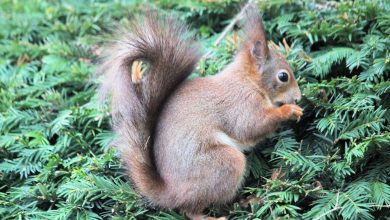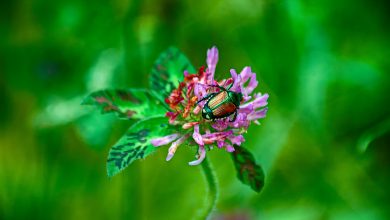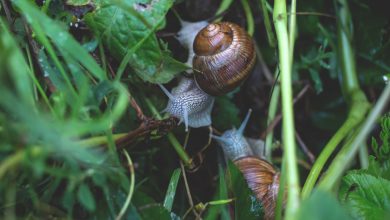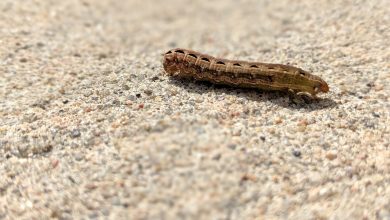How to Get Rid of Squirrels in the Garden
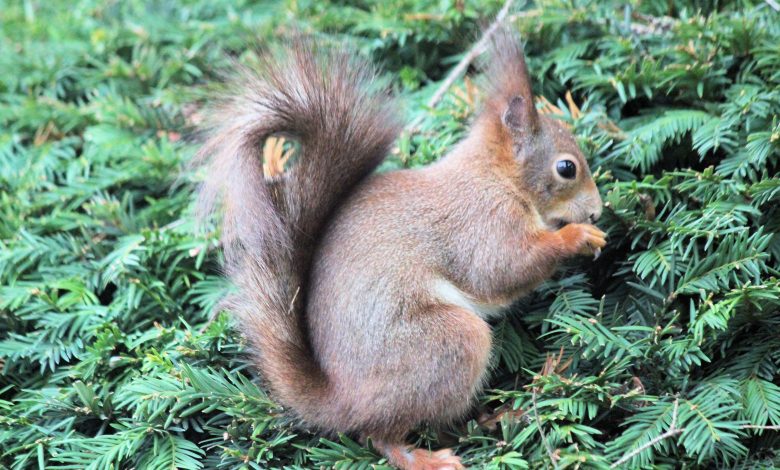
When we hear the term garden pest, most people would assume we’re talking about aphids, worms, or grubs. While that’s often the case, there are some gardeners who are dealing with a whole other type of pest, and that is the squirrel.create a homemade mixture
Dealing with squirrels will be different than dealing with small insects, but failing to take the right precautions will leave your garden in similar disarray. If you’ve noticed that a group of squirrels has been hanging out in your yard for a while, it’s time to investigate what they’re so interested in.
For gardeners who are struggling with these garden pests, this is a guide to help you get rid of squirrels in the garden.
The Squirrel
Squirrels are all grouped in a category called Sciuridae, which includes small to medium-sized rodents. There are two types of squirrels: tree squirrels and ground squirrels.
This little creature has been around for a very long time, with some of the earliest squirrel fossils dating back to the Eocene period. They are related to the mountain beaver, the dormouse, and other similar rodents.
There exists quite a large range of different squirrel breeds, from the tiny pygmy squirrel, to the giant flying squirrel. Their length ranges, but in general, these animals are seen with slender bodies, bushy tails, and short pointed ears.
The fur of the squirrel is soft and smooth, but the thickness differs depending on where the breed is located in the world. Even squirrels in the same species will show differences in their fur and size.
Squirrels have learned how to be very flexible when it comes to their habitat. They can flourish in deserts, polar regions, and even tropical rainforests. Of course, many homeowners also know that squirrels will happily make a home in attics and sheds if possible, especially during the winter months in colder regions.
What Do Squirrels Eat?
Squirrels are primarily herbivores, so they usually feast on bark, nuts, fruits, vegetation, and fungi. If you are growing any of these items in your garden, you are already calling attention to your space more than others.
Squirrels are at their most desperate for food in the springtime when food is scarce and nuts are still buried. This is when these pests will become more destructive and ravenous, so you’ll want to keep an eye on your garden and shed in case they make them a target for a potential food source.

What to Look For
A few squirrels in your yard isn’t a problem; in fact, it’s very normal. This is especially true if your area has a lot of parks, tall trees, and shady places for them to rest. However, there are a few signs to look for if you’re starting to think the squirrels are getting a little too comfortable in your garden.
Droppings
If there are squirrels demolishing your garden, then chances are, they are eating well. Squirrel droppings are usually scattered all over an area, but you might find some small piles if they have a specific place they like to eat in your yard.
Droppings will appear brown to reddish-brown, usually in the shape of an oblong pellet. Squirrel droppings are larger than those of a rat and are more barrel-shaped. If you’re noticing more of these showing up in your yard, you may have a population issue.
Scratching Marks
Squirrels are most popularly seen in trees, but don’t underestimate their ability to get up and into anything they have their eyes on. Some squirrels are capable of scaling flat, concrete walls with the tiny grips on their paws and sharp nails.
If you suspect that you’ve got a rodent problem in your yard, consider doing a closer inspection of the sides of your home, your fencing, and any existing shed. When colder months come around, these little pests start to look for places to stay warm, and you’ll know it by their nail marks.
Wood surfaces are the easiest to see, but if you’ve got any kind of structure in your space, it’s likely that it’s been scratched, tampered with, or worn down by their constant passing.
Chewing
Squirrels are constantly chewing on anything they can get their paws on. The chewing helps them to keep their incisors sharp and from growing too long.
If you think you have squirrels in the garden, you can look for chewing as a sign. Squirrels will go for tasty surfaces like wood, so you might notice chew spots on your fencing, shed, or deck. Alternatively, squirrels will use garden décor, garbage bins, and anything soft enough to bite into.
Digging
Squirrels love their nuts, and they’re pretty adamant about where they put them. Namely, they will happily bury them in your newly-laid lawn, or they will dig them up when the snow starts to melt. A squirrel can bury as many as 100 nuts a day, so your lawn can take a real beating!
This can be a very frustrating process for homeowners who are trying to introduce new grass or plants to their garden space. Squirrels will quickly dig up the area in search of their favorite snack and leave a mess behind.

What Squirrels Love to Eat in Your Garden
Squirrels aren’t very picky when it comes to their meals. If they’re in a tight squeeze, some have even been known to become carnivores, eating small lizards, mice, and other rodents.
Tomatoes
When it comes to human food, squirrels are frustrating in that they usually go after the best harvests, take a few bites, then move on to the next. Many gardeners have been devastated to see their crops dropped to the ground with only a bite or two taken.
Tomatoes are the main victim of squirrels, who will pull down tomatoes from the highest point, usually breaking the rest of the plant on their way down. They’ll eat as much as half of a tomato, but hardly more than that.
To protect tomatoes:
- Create a full barrier around your tomato plants out of chicken wire. You’ll want to ensure that there is a roof structure as well since squirrels are more than happy to climb fences or trees and drop down from above.
- A chili pepper spray can be applied to tomatoes, which will deter the squirrels with its scent. You can create a homemade mixture and spray it all over the plant. This is a safe approach, so long as you remember to wash them off before consuming.
Corn
Squirrels love to eat corn on the cob. In some cases, squirrels will take down entire harvests of corn in just a day or two
To protect corn:
- Plant your corn harvest away from trees and fences, if possible. This is especially effective if you also create a barrier that they cannot get over without coming from a tall tree or shed.
- Build fencing around your crop that is at least three feet in height. You can also create a barrier beneath the ground with chicken wire that is at least six inches deep. This will help deter them from getting at the base of the plants.
- Hang noise-makers from the barriers around your corn, which can sometimes frighten the squirrels away.
Bulbs
Squirrels require a diet that is protein-rich, and bulbs are a key source of this kind of nutrient. A squirrel problem can make it almost impossible to plant tulips and other bulbs that sit through the winter and bloom in the spring.
Some squirrels are even known to watch bulbs get planted and then will later attack the same location for a feast.
To protect your bulbs:
- Plant your bulbs as you normally would, then lay down a large piece of chicken wire across the topsoil. Secure the wire with stakes so that you know where the area is. Then, cover the wire with some additional soil and mulch so that the seedlings can come through, but the bulbs will be protected.
- Wrap your plant bulbs in chicken wire, then plant them as you normally would. The stem will still grow through the wire, but this will protect the bulb from squirrels, as well as burrowing diggers such as moles.
- Plant your bulbs close to established plants that take up a lot of space. A creeping plant will do well since squirrels are less likely to have the energy to try to dig through all the existing plants to find the bulbs.
- Sharp gravel is a deterrent for squirrels since they don’t like to dig through it. They will prefer softer soils elsewhere and leave your plants alone. This is only an ideal option if you don’t have nosy pets or curious kids.
- Choose bulbs that squirrels don’t like. Squirrels will go in search of tulip and crocus bulbs, but they don’t seem to favor daffodils, snowdrops, hyacinth, or scilla.
- Wait until closer to the wintertime to plant your bulbs. Even though the best time is in the fall, this is when squirrels are still actively looking for food to store. Wait a little longer, until squirrel activity seems to have slowed down.

Preventing Squirrels in your Garden
The following are some of the basic approaches you can use to deter squirrels from overpopulating in your garden. Keep in mind squirrels will likely come back each year to see if you’re keeping up with your tactics, so you’ll want to be diligent.
Take Away Soft Materials
Squirrels are always on the lookout for warm, safe places to build their nests. They are especially active mid-to-end of winter when they are prepping for mating season.
It’s important that you put away any kind of soft materials that the squirrels could have access to. Items such as burlap are the perfect material for building a nest, and they’ll happily rip your burlap to pieces to create a warm space.
If you have a shed that is definitely inaccessible to the squirrels, you can store these kinds of materials there. However, if your shed has some holes and access points, don’t be surprised if they make a home right in your shed! In these cases, bring all nest-worthy materials inside for the winter.
Never Feed Squirrels
They look cute and unassuming, but squirrels will become your nightmare if you ever try to feed them. These garden pests are very food driven, and if you feed them once, they will continue to come back again and again.
The worst part is they may bring some hungry stragglers along with them who will be happy to join in on the charity. Do not let squirrels know your location is the place for food.
Remove All Food Sources
Other than your protected bulbs and vegetables, you should never leave any other kind of food source outside. This includes anything and everything that squirrels would find enticing, like barbecue crumbs, pet food, and the like.
Squirrels have a taste for things they can’t usually get, and they’ll become more and more nosey if they keep finding meals in your yard.
Additionally, bird feeders are a huge attraction for squirrels. These garden pests love to make a huge mess from feeders and often end up knocking them down. The first suggestion would be to remove the feeders, but then the birds lose out as well.
If you have a hanging bird feeder, hang it using a razor wire to deter them from climbing down to it. Additionally, hang it on a branch long enough to keep it away from other branches.
If you have a bird feeder on a pole, install a pole that is either too slippery for the squirrels or has a blocking mechanism.
Add Plants that Squirrels Hate
If you already know that you’ve got a large squirrel population in your neighborhood, then you might want to take preventative measures in the fall to prepare for the following spring.
Planting things that squirrels dislike is a great way to keep them out of your garden. Fortunately, these plants are all very beautiful and won’t be a deterrent of any kind to your garden design.
One of the best plants to incorporate is the daffodil. They will be a beautiful addition to your garden, but they also have a toxin that makes them inedible to pests. Aside from deterring squirrels, you can also deter deer and rabbits too.
Other flowers you can plant to repel garden pests include lily-of-the-valley, hyacinth, geraniums, and alliums.

Noise Makers
Squirrels might seem confident when they’re rifling through your garden, but a single sound will have them running for their lives. They are very jittery creatures by nature, and you can take advantage of this with some homemade noisemakers.
Consider hanging some wind chimes all around your garden space, especially where the squirrels seem to be most active.
Predatory Warnings
Squirrels are very aware of the space around them, and they won’t chance going into a yard if they know there’s a predator nearby. If you have an outdoor dog or cat, encourage it to hang around in the backyard when squirrels are active.
When you brush your pet’s hair, save the extra hair and bury it throughout your yard. If a squirrel begins to dig in your garden and comes across the smell of a predator, they are likely to avoid the area.
If you don’t have a pet, you can also implement some decoys around the yard that resemble squirrel predators, such as a hawk or owl.
Spicy Sauces
Humans sometimes like the shock of a little spice in their food, but small mammals like squirrels will do anything to avoid it. With this in mind, a spicy liquid of some kind can be utilized to keep the garden pest at bay.
We would suggest combining red pepper flakes or hot sauce of some kind with water. You can mix them in a spray bottle and spray your plants for protection. The good news is this is a natural way to go about deterring squirrels, and it will be of no harm to humans, either.
Make sure to wash any foods off if you’re harvesting them.
Coffee Grounds
Lots of humans love the smell of coffee in the morning, but there’s nothing that the squirrels hate more. A lot of pets are deterred by the aroma of coffee, so you’ll be winning in more ways than one.
You can sprinkle the coffee grinds around your yard, so long as you are mindful of how much you are using. Gardeners sometimes put coffee grounds right around their plants, but this can make plant-growing more difficult.
Microorganisms in the soil will turn their attention to breaking down the coffee grounds and stop putting in as much effort with actual plants. Not to mention, too many coffee grounds can actually change the acidity of your soil in the long run.
To deter garden pests, sprinkle the coffee grounds lightly, and avoid getting too close to plants.
Why You Should Get Rid of Squirrels in Your Garden
A few squirrels in your yard is fine, and even sometimes entertaining to watch. However, the more you have, the worse of a problem you could run into.
Squirrels can be very destructive; they can chew through wire and metal, and they can cause huge problems with piping, insulation, and other expensive parts. If they deem your home or garden a place of value, you could find them chewing through shingles, walls, outdoor furniture, and more.
Avoid all of this by being responsive to growing numbers in your garden. These preventative measures should help you enjoy a manageable squirrel population.
